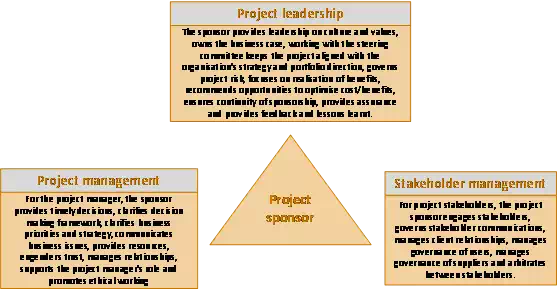Project sponsor
The project sponsor usually chairs the project steering committee and is the link between the organisationís senior executive body and the project. In addition to being an experienced organisational executive, well versed in the details of organisational stakeholder and client requirements and relationships, the sponsor needs to have sound project management capability.

Figure 4 Project sponsor's main roles[1]
The responsibilities of the project sponsor are:
∑ ultimate accountability and responsibility for a project;
∑ decision making, directing and representational accountabilities for the project (project sponsors are variously titled such as SRO in the Gateway context;
∑ chairing the project steering committee;
Ė an exception might occur where the project sponsor/SRO is the Secretary of a department, who may delegate the role of steering committee chair to another senior officer. Where the chair is not the project sponsor, clarity around authority tolerances and lines of accountability between the chair and the project sponsor is critical.
∑ ensuring project assurance processes, such as Gateway reviews (if required) are scheduled and responded to in a timely manner;
∑ ownership of the project business case and in particular its approved expenditure and claimed benefits;
∑ providing effective oversight and guidance on the ongoing identification of risks and associated treatment options and ongoing risk management activities;
∑ overseeing business management and project management risk and issues that arise outside the formal business of the steering committee (the sponsor also lends support, providing advocacy at senior levels and ensures necessary resources, both financial and human, are available to the project);
∑ identifying and appointing the project manager or director and key project personnel, providing advice and support and where necessary remedying project team performance issues on a timely basis;
∑ providing guidance on the identification and engagement of stakeholders;
∑ ultimate accountability for the realisation of outcomes (ensuring the ongoing fit of project outputs to program/strategic goals);
∑ ensuring that a post-implementation review is scheduled and takes place; and
∑ ensuring a project is undertaken according to the Project Management Framework.

Figure 5 Evolving focus of governance††††††††††††††††††††††††††††††††††††††††
The project sponsorís role changes over time in line with the evolving focus of governance as described in Figure 5. The project sponsor is responsible and accountable for the project until an investmentís outcomes are secured. These outcomes may not be realised until well after a project manager and the associated project team have completed their involvement.
The project sponsor (or SRO) must be identified for all projects, no matter what size, complexity or risk profile.
The project sponsor may also be the operations (asset) manager for the project. The Client Entity and project sponsor may be represented by the same person for some projects.
The Victorian Government requires a project sponsor or SRO to be identified for all projects and that the accountability for the investment - its progress through the project phase and delivery of benefits - is reflected in their annual performance plan.